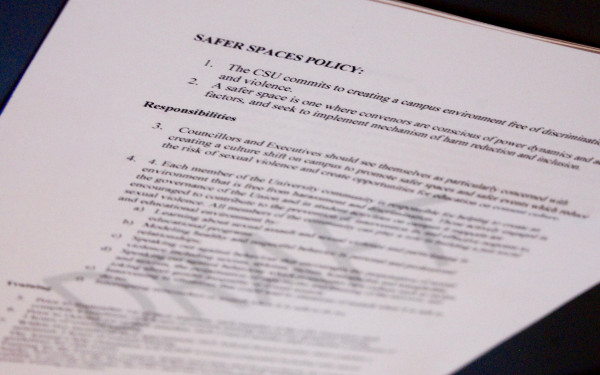Concordia Students Raising Awareness for Oromo Struggle
Talk on Thursday Night to Discuss the Issues While Promoting a Petition
Two Concordia students are pushing to raise awareness for a struggle taking place over 6,500 miles away.
Julia Sutera Sardo and Michele Sandiford, in collaboration with Amnesty International Concordia, organized an event called Oromo Solidarity Project: Awareness Night, to bring light to the current struggle of the Oromo people of Ethiopia. The event is taking place on Thursday, March 3 at 6 p.m. in the Hive Café downtown.
Two guests from the Oromo Canadian Cultural Association of Ottawa will speak on Thursday. At the event, a petition will be circulated aiming to assist Amnesty International to create a “concrete campaign” to address the issue—possibly by releasing political prisoners.
“I’m happy to see that people are interested in helping out a group of people who seem so far away,” Sandiford said. “There are many connections Concordia students can make with Indigenous land rights and police brutality, so I think this ties into a lot of things the student body has expressed concerns about.”
The Oromo struggle
The Oromia territory—which is the largest of nine ethnically based regional states in Ethiopia—surrounds the capital city, Addis Ababa. The government, called Oromo Peoples’ Democratic Organization, has been attempting to annex rural Oromo land into the capital —a scheme they labelled the “Master Plan.”
Since the plan was announced in 2014, security forces have killed hundreds of demonstrators. Protests in Oromia restarted in November 2015.
“The issue is not only that the government is taking over the land, but that they’re not allowing these people to have their own representation and give their own opinions,” Sutera Sardo said.
The Oromo demonstrations have been largely peaceful.
“There was nothing very violent. It does not even compare to what happened over here in 2012,” she continued, referring to the Maple Spring movement in Montreal.
Security forces have allegedly fired on protesters, and detained thousands without trial. Human Rights Watch has reported on “almost daily” killings and arrests since the beginning of 2016. Demonstrators have also been labelled as terrorists by the authorities.
The OPDO has put a halt on expansion, but plan on reimplementing it once a “consensus” is reached.
The push for awareness
Sutera Sardo and Sandiford—both students in the School of Community and Public Affairs department—became interested in the issue in November 2015, coinciding with the beginning of the Oromo student protests.
“We both have this interest in ensuring that other people are taken care of and they’re not being neglected by the mainstream media or being oppressed by their countries,” Sutera Sardo explained.
Following advice found on the Amnesty International website, the pair are looking to mobilize students at Concordia, who according to Sutera Sardo are “very passionate about helping one another.”
Amnesty International wants to address Oromian oppression with a concrete campaign. According to Sutera Sardo, the petition is asking for the release of opposition party leader Bekele Gerba, who was arrested on Dec. 24 2015 for involvement with student protests.
The petition is just the first step, she said. After that, they would like to write messages to political prisoners via a letter writing campaign.
“These letters will probably be written within the next couple of weeks. We’ll probably organize a couple of letter writing sessions to get ideas flowing,” she explained. “We’re basically trying to get the brainstorm out on Thursday to see what everyone else has to say about it.”
They will be hosting two guest speakers at the event: Said Abdosh and Feleke Bogale, both members of the Oromo Canadian Cultural Association of Ottawa.
“[With the guests] we might be able to have more poignant and valuable information that stems from their own personal experiences, and also the experiences of the community, and how that’s been affecting them,” she said.
The project has received positive feedback from members of the Canadian Ethiopian community, according to Sutera Sardo.
She hopes that through the letter campaign, they can make a small difference and potentially bring the issue to the attention of the Trudeau government.
“It is 2016, so it’s time for them—and for everybody—to acknowledge what’s going on, and avoid a repeat of the Rwandan genocide, because the people of Ethiopia do not deserve to suffer.”


_600_375_90_s_c1.jpg)
2_600_375_90_s_c1.jpg)
